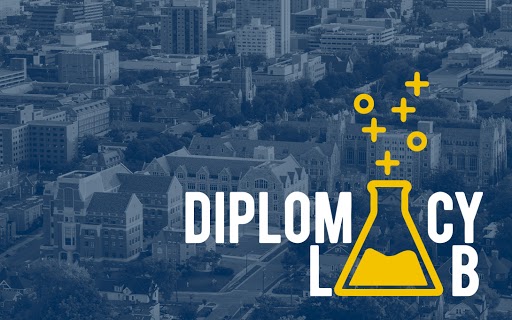
For the third year in a row, University of Michigan students tackled policy-relevant questions posed by the U.S. State Department officials in Diplomacy Lab (DipLab) projects.
In the Winter 2022 term, graduate and undergraduate students formed teams, identified willing faculty supervisors, and submitted bids for their projects before diving into the research process. Each team chose a topic from a menu of options outlined by the State Department. Projects included policy-relevant questions around cultural education in Latin America, shared climate goals in Northern Japan, rebuilding ethical solar supply chains, evacuation planning at the U.S. Embassy in Beirut, human trafficking, and cultural property agreements to preserve cultural heritage.
Maxwell Barmack (BA’22) said he chose to participate in DipLab because it allowed him to put coursework into practice while contributing to U.S. diplomacy. His team analyzed the cultural and educational influence of the People’s Republic of China in Chile. “PRC diplomatic projects such as the Belt and Road Initiative have gotten a lot of attention in recent years, so I was excited to dig into what might be a similarly meaningful diplomatic expansion in South America,” Barmack said.
Ambassador Melvyn Levitsky supervised the project, which aimed to establish a thorough understanding of the activities of Confucius Institutes within Chile and other means of cultural exchange that occurred through state-sponsored events and media. The team conducted broad analyses about the Chilean economy, political system, and culture before interviewing relevant experts specifically about the Confucius Institutes in Chile. The team presented their findings in a memo to U.S. Embassy officials.
Several of the students had backgrounds in Chinese language and history, as well as Latin American studies and diplomacy, which helped them tackle roadblocks that came with the process. For example, to combat the difficulties in the accuracy of official Confucius Institute documents, the group used their background knowledge of the region to set up meetings with people who had previously worked at Confucius Institutes.
Christian Neubacher (MPP’23) explained the motivation for working on a project focused on advancing the U.S. and Japan’s shared climate goals in northern Japan. “I wanted to gain a hands-on, practical experience related to diplomacy which could complement my extensive coursework on international policy, and the Diplomacy Lab is the perfect opportunity for gaining such an experience,” Neubacher said. “Our group wanted to participate in a project with a concrete set of deliverables related to climate diplomacy, and our project on using American diplomacy to further net-zero targets in Hokkaido, Japan was the ideal project for pursuing this aim.”
The aim of this project was to determine a set of policy initiatives to strengthen “Zero Carbon Hokkaido,” Hokkaido’s decarbonization efforts in partnership with the U.S., to reinforce the cooperation between the U.S. and Japan’s shared green energy goals. Team members began with an extensive research phase that led to an outline of broad policy options and then a narrowed list of recommendations. The students developed a policy brief which was presented to the Consulate in Hokkaido, Japan.
Ambassador Susan Page supervised the team. “It was very useful to run our ideas by Ambassador Page as she had the practical knowledge about what an Embassy or Consulate is able to implement,” said Neubacher.
Partnering with the State Department’s Office of Global Partnerships was valuable for team members in structuring their projects and providing clarity on the feasibility of their policy suggestions. “We had a few meetings with our counterparts in Japan which were highly instructive in shaping our recommendations and providing clarity about what the Consulate's needs and aims related to climate diplomacy are, and what their capacities for implementing any recommendations would be,” said Neubacher. “We appreciated our counterpart's enthusiastic support of our project, and interest in working with us on transforming our initial ideas into concrete policies.”
The projects for the Winter 2022 semester included:
- “Analyzing cultural and educational influence of the PRC in Chile” - Megan Tigue (BA’22), Hanna Schechter (BA’22), Maxwell Barmack (BA’22), Lauren Peng (BA’23)
- “Advancing the U.S. and Japan's Shared Climate Goals in Northern Japan, What is the Role of the U.S.?” - Taylor Stensen (MPP '23), Samir Deshpande (MPP '23), Tyler Herr (MPP'23), Christian Neubacher (MPP '23), Rei Kubota (BA '24), Will Kleim (BA '23)
- “Supporting ArcGIS Mapping Efforts and Evacuation/Crisis Planning at Embassy Beirut” - Mohamed Ayoub (MPA’22), Ryan Fogarty (MPA’22), Rawan Ajaz Latif (MPP’23), Anna Rymill (MPP’23), Max Shpilband (MPP’23)
- “Forced Labor in Xinjiang and its Impact on the Global Solar Supply Chain, Office Office of Energy Diplomacy” - Jillian Mammino (MPP’23), Alexis Kenworthy (MBA/MPP’23), Jonathan Garon (MPP’23), Daniel Hayes (MPP’23), Hannah Cumming (MPP/JD’24)
- “Human Trafficking Country Profiles” - Erin Kwiatkowski (Law ‘23), Frank Sunderland (Law ‘23), Cheyenne Kleinberg (Law ‘23), Erica Paul (Law ‘23)
- “Researching and Drafting of Statement of Facts (SoF) for Cultural Property Agreement” - Fanta Condé (MPP’22), Nomindari Gousakoff (MPP’22), Rasha Mohamed (MPP’23), Isaac Nico (MPA’22)
About Diplomacy Lab
The State Department’s Office of Global Partnerships works with over 40 university partners around the country to engage students to help tackle pressing, policy-relevant questions posed by active State Department officials. The Ford School’s Weiser Diplomacy Center serves as U-M’s administrative hub for the program. Established in 2013, Diplomacy Lab lists focuses on engagement and education, allowing “policymakers to tap into an underutilized reservoir of intellectual capacity,” and “contributing to the Secretary’s public diplomacy goals.”